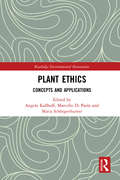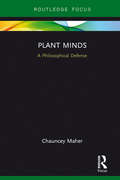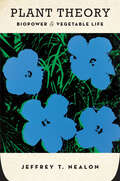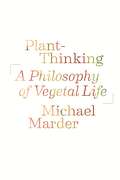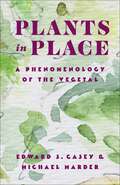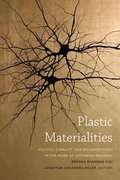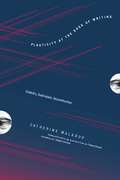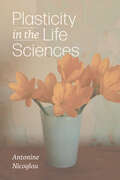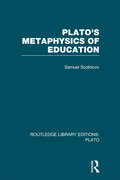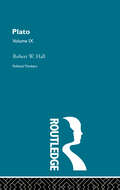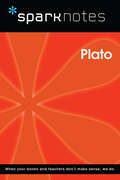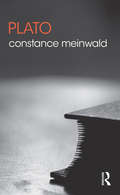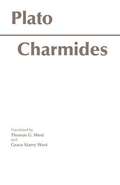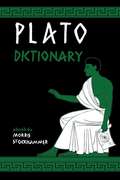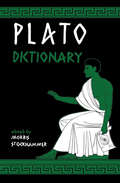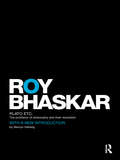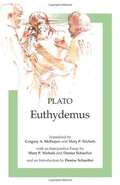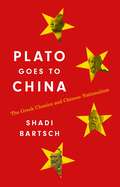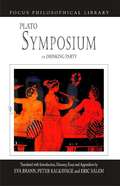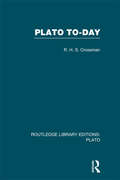- Table View
- List View
Plant Ethics: Concepts and Applications (Routledge Environmental Humanities)
by Angela Kallhoff, Marcello Di Paola and Maria SchörgenhumerLarge parts of our world are filled with plants, and human life depends on, interacts with, affects and is affected by plant life in various ways. Yet plants have not received nearly as much attention from philosophers and ethicists as they deserve. In environmental philosophy, plants are often swiftly subsumed under the categories of "all living things" and rarely considered thematically. There is a need for developing a more sophisticated theoretical understanding of plants and their practical role in human experience. Plant Ethics: Concepts and Applications aims at opening a philosophical discussion that may begin to fill that gap. The book investigates issues in plants ontology, ethics and the role of plants and their cultivation in various fields of application. It explores and develops important concepts to shape and frame plants-related philosophical questions accurately, including new ideas of how to address moral questions when confronted with plants in concrete scenarios. This edited volume brings together for the first time, and in an interdisciplinary spirit, contemporary approaches to plant ethics by international scholars of established reputation. It will be of great interest to students and scholars of Philosophy and Ethics.
Plant Life: The Entangled Politics of Afforestation
by Rosetta S. ElkinHow afforestation reveals the often-concealed politics between humans and plantsIn Plant Life, Rosetta S. Elkin explores the procedures of afforestation, the large-scale planting of trees in otherwise treeless environments, including grasslands, prairies, and drylands. Elkin reveals that planting a tree can either be one of the ultimate offerings to thriving on this planet, or one of the most extreme perversions of human agency over it. Using three supracontinental case studies—scientific forestry in the American prairies, colonial control in Africa&’s Sahelian grasslands, and Chinese efforts to control and administer territory—Elkin explores the political implications of plant life as a tool of environmentalism. By exposing the human tendency to fix or solve environmental matters by exploiting other organisms, this work exposes the relationship between human and plant life, revealing that afforestation is not an ecological act: rather, it is deliberately political and distressingly social. Plant Life ultimately reveals that afforestation cannot offset deforestation, an important distinction that sheds light on current environmental trends that suggest we can plant our way out of climate change. By radicalizing what conservation protects and by framing plants in their total aliveness, Elkin shows that there are many kinds of life—not just our own—to consider when advancing environmental policy.
Plant Minds: A Philosophical Defense (Routledge Focus on Philosophy)
by Chauncey MaherThe idea that plants have minds can sound improbable, but some widely respected contemporary scientists and philosophers find it plausible. It turns out to be rather tricky to vindicate the presumption that plants do not have minds, for doing so requires getting clear about what plants can do and what exactly a mind is. By connecting the most compelling empirical work on plant behavior with philosophical reflection on the concept of minds, Plant Minds aims to help non-experts begin to think clearly about whether plants have minds. Relying on current consensus ideas about minds and plants, Chauncey Maher first presents the best case for thinking that plants do not have minds. Along the way, however, he unearths an idea at the root of that case, the idea that having a mind requires the capacity to represent the world. In the last chapter, he defends a relatively new and insightful theory of mind that rejects that assumption, making room for the possibility that plants do have minds, primarily because they are alive.
Plant Theory
by Jeffrey NealonIn our age of ecological disaster, this book joins the growing philosophical literature on vegetable life to ask how our present debates about biopower and animal studies change if we take plants as a linchpin for thinking about biopolitics. Logically enough, the book uses animal studies as a way into the subject, but it does so in unexpected ways. Upending critical approaches of biopolitical regimes, it argues that it is plants rather than animals that are the forgotten and abjected forms of life under humanist biopower. Indeed, biopolitical theory has consistently sidestepped the issue of vegetable life, and more recently, has been outright hostile to it. Provocatively, Jeffrey T. Nealon wonders whether animal studies, which has taken the "inventor" of biopower himself to task for speciesism, has not misread Foucault, thereby managing to extend humanist biopower rather than to curb its reach. Nealon is interested in how and why this is the case. Plant Theory turns to several other thinkers of the high theory generation in an effort to imagine new futures for the ongoing biopolitical debate.
Plant-Thinking: A Philosophy of Vegetal Life
by Michael MarderThe margins of philosophy are populated by non-human, non-animal living beings, including plants. While contemporary philosophers tend to refrain from raising ontological and ethical concerns with vegetal life, Michael Marder puts this life at the forefront of the current deconstruction of metaphysics. He identifies the existentials features of plant behavior and the vegetal heritage of human thought so as to affirm the potential of vegetation to resist the logic of totalization and to exceed the narrow confines of instrumentality. Reconstructing the life of plants "after metaphysics," Marder focuses on their unique temporality, freedom, and material knowledge or wisdom. In his formulation, "plant-thinking" is the non-cognitive, non-ideational, and non-imagistic mode of thinking proper to plants, as much as the process of bringing human thought itself back to its roots and rendering it plantlike.
Plant-Thinking: A Philosophy of Vegetal Life
by Michael MarderThe margins of philosophy are populated by non-human, non-animal living beings, including plants. While contemporary philosophers tend to refrain from raising ontological and ethical concerns with vegetal life, Michael Marder puts this life at the forefront of the current deconstruction of metaphysics. He identifies the existential features of plant behavior and the vegetal heritage of human thought so as to affirm the potential of vegetation to resist the logic of totalization and to exceed the narrow confines of instrumentality. Reconstructing the life of plants "after metaphysics," Marder focuses on their unique temporality, freedom, and material knowledge or wisdom. In his formulation, "plant-thinking" is the non-cognitive, non-ideational, and non-imagistic mode of thinking proper to plants, as much as the process of bringing human thought itself back to its roots and rendering it plantlike.
Plants in Place: A Phenomenology of the Vegetal (Critical Life Studies)
by Edward S. Casey Michael MarderPlants are commonly considered immobile, in contrast to humans and other animals. But vegetal existence involves many place-based forms of change: stems growing upward, roots spreading outward, fronds unfurling in response to sunlight, seeds traveling across wide distances, and other intricate relationships with the surrounding world. How do plants as sessile, growing, decaying, and metamorphosing beings shape the places they inhabit, and how are they shaped by them? How do human places interact with those of plants—in lived experience; in landscape painting; in cultivation and contemplation; in forests, fields, gardens, and cities?Examining these questions and many more, Plants in Place is a collaborative study of vegetal phenomenology at the intersection of Edward S. Casey’s phenomenology of place and Michael Marder’s plant-thinking. It focuses on both the microlevel of the dynamic constitution of plant edges or a child’s engagement with moss and the macrolevel of habitats that include the sociality of trees. This compelling portrait of plants and their places provides readers with new ways to appreciate the complexity and vitality of vegetal life. Eloquent, descriptively rich, and insightful, the book also shows how the worlds of plants can enhance our understanding and experience of place more broadly.
Plastic Materialities: Politics, Legality, and Metamorphosis in the Work of Catherine Malabou
by Jonathan Goldberg-Hiller Brenna BhandarCatherine Malabou's concept of plasticity has influenced and inspired scholars from across disciplines. The contributors to Plastic Materialities--whose fields include political philosophy, critical legal studies, social theory, literature, and philosophy--use Malabou's innovative combination of post-structuralism and neuroscience to evaluate the political implications of her work. They address, among other things, subjectivity, science, war, the malleability of sexuality, neoliberalism and economic theory, indigenous and racial politics, and the relationship between the human and non-human. Plastic Materialities also includes three essays by Malabou and an interview with her, all of which bring her work into conversation with issues of sovereignty, justice, and social order for the first time.Contributors. Brenna Bhandar, Silvana Carotenuto, Jonathan Goldberg-Hiller, Jairus Victor Grove, Catherine Kellogg, Catherine Malabou, Renisa Mawani, Fred Moten, Alain Pottage, Michael J. Shapiro, Alberto Toscano
Plasticity at the Dusk of Writing: Dialectic, Destruction, Deconstruction (Insurrections: Critical Studies in Religion, Politics, and Culture)
by Catherine MalabouA former student and collaborator of Jacques Derrida, Catherine Malabou has generated worldwide acclaim for her progressive rethinking of postmodern, Derridean critique. Building on her notion of plasticity, a term she originally borrowed from Hegel's Phenomenology of Spirit and adapted to a reading of Hegel's own work, Malabou transforms our understanding of the political and the religious, revealing the malleable nature of these concepts and their openness to positive reinvention. In French to describe something as plastic is to recognize both its flexibility and its explosiveness-its capacity not only to receive and give form but to annihilate it as well. After defining plasticity in terms of its active embodiments, Malabou applies the notion to the work of Hegel, Heidegger, Levinas, Levi-Strauss, Freud, and Derrida, recasting their writing as a process of change (rather than mediation) between dialectic and deconstruction. Malabou contrasts plasticity against the graphic element of Derrida's work and the notion of trace in Derrida and Levinas, arguing that plasticity refers to sculptural forms that accommodate or express a trace. She then expands this analysis to the realms of politics and religion, claiming, against Derrida, that "the event" of justice and democracy is not fixed but susceptible to human action.
Plasticity in the Life Sciences
by Antonine NicoglouAnalyzes the reasons why biologists have referred to and continue to refer to plasticity. Plasticity has become an important topic in biology, with some even wondering if it has now acquired the theoretical importance in biology that the concept of the gene enjoyed at the beginning of the last century. In this historical and epistemological study, philosopher Antonine Nicoglou shows how the recurrence of the general idea of plasticity—throughout the history of the life sciences—indicates its essential role in the way we think about life processes. Although plasticity has become a key element in new evolutionary thinking, she argues, its role in contemporary biology is also not insignificant. Rather, as mobilized in contemporary biology, plasticity most often seeks to account for the specific nature of living systems. The book is divided into two parts. The first takes up the history of plasticity from Aristotle to contemporary biology; the second part offers an original way of distinguishing between different phenomena described by “plasticity.” In the process, the author explores what has led some biologists to speak of plasticity as a way of overcoming genetic determinism.
Plato
by David Sedley Alex LongThe Clitophon, a dialogue generally ascribed to Plato, is significant for focusing on Socrates' role as an exhorter of other people to engage in philosophy. It was almost certainly intended to bear closely on Plato's Republic and is a fascinating specimen of the philosophical protreptic, an important genre very fashionable at the time. This is the first critical edition of this dialogue to be published in nearly seventy years. Professor Slings here provides a text based on new examination of all relevant manuscripts and accompanies it with a translation. His extensive introduction studies philosophical exhortation in the classical era, and tries to account for Plato's dialogues in general as a special type of exhortation. The Clitophon is seen as a defence of the Platonic dialogue. The commentary, the first ever to be published in English, elucidates the Greek and discusses many passages where the meaning is not entirely clear.
Plato
by M. C. Howatson Frisbee C. C. Sheffield M. C. Howatson Frisbee C. C. SheffieldPlato's Symposium, written in the early part of the 4th century BC, is set at a drinking party (symposium) attended by some of the leading intellectuals of the day, including Aristophanes, the comic dramatist, Socrates, Plato's mentor, and Alcibiades, the brilliant but (eventually) treacherous politician. Each guest gives a speech in praise of the benefits of desire and its role in the good and happy human life. At the core of the work stands Socrates' praise of philosophical desire, and an argument for the superiority of the philosophical life as the best route to happiness. This edition provides an accessible and engaging new translation by M. C. Howatson, and a substantial introduction, by Frisbee Sheffield, which guides the reader through the various parts of the dialogue and reflects on its central arguments. A chronology and detailed notes on the participants help to set this enduring work in context.
Plato
by Harvey YunisOstensibly a discussion about love, the debate in the Phaedrus also encompasses the art of rhetoric and how it should be practised. This new edition contains an introductory essay outlining the argument of the dialogue as a whole and Plato's arguments about rhetoric and eros in particular. The Introduction also considers Plato's style and offers an account of the reception of the dialogue from its composition to the twentieth century. A new Greek text of the dialogue is accompanied by a select textual apparatus. The greater part of the book consists of a Commentary, which elucidates the text and makes clear how Plato achieves his philosophical and literary objectives. Primarily intended for advanced undergraduates and graduate students of ancient Greek literature and philosophy, it will also benefit scholars who want an up-to-date account of how to understand the text, argument, style and background of the work.
Plato 's Metaphysics of Education (Routledge Library Editions: Plato)
by Samuel ScolnicovThis volume provides a comprehensive, learned and lively presentation of the whole range of Plato’s thought but with a particular emphasis upon how Plato developed his metaphysics with a view to supporting his deepest educational convictions. The author explores the relation of Plato’s metaphysics to the epistemological, ethical and political aspects of Plato’s theory of education and shows how Plato’s basic positions bear directly on the most fundamental questions faced by contemporary education.
Plato (Political Thinkers Ser. #Vol. 9)
by Robert HallFirst published in 1981 this unique study discusses the evolution of Plato's thought through the actual developments in Athenian democracy, the book also demonstrates Plato's continuing responses to changes in political theory and argues for a new understanding of Plato's goals for the state and his ultimate concern for the moral well-being of the citizens.
Plato (SparkNotes Philosophy Guide)
by SparkNotesPlato (SparkNotes Philosophy Guide) Making the reading experience fun! SparkNotes Philosophy Guides are one-stop guides to the great works of philosophy–masterpieces that stand at the foundations of Western thought. Inside each Philosophy Guide you&’ll find insightful overviews of great philosophical works of the Western world.
Plato (The Routledge Philosophers)
by Constance MeinwaldIn this engaging introduction, Constance Meinwald shows how Plato has shaped the landscape of Western philosophy. She provides much-needed historical context, and helps readers grapple with Plato’s distinctive use of highly crafted literary masterpieces for philosophical purposes. Meinwald examines some of Plato’s most famous discussions of human questions, concerning erōs, the capacities and immortality of our psyche, human excellence and the good life, and Plato’s controversial ideas about culture, society, and political organization. She shows how Plato makes a sketch of his theory of Forms foundational in this work, and she offers illuminating readings of texts concerned with the development of the theory and its relationship to Greek science and mathematics. Throughout, Meinwald draws expertly on Plato’s dialogues to present a lively and accessible picture of his philosophy. Including a chronology, glossary of terms, and suggestions for further reading, Plato is an ideal introduction to arguably the greatest of all Western philosophers, and is essential reading for students of ancient philosophy and classics.
Plato Charmides
by Plato Thomas G. West Grace Starry WestThe Charmides is set in Athens just after the siege and battle of Potidaea (431 B.C.), the first important engagement of the long Peloponnesian War between Athens and Sparta.
Plato Dictionary
by Morris StockhammerIn this companion volume to the well-known Aristotle Dictionary, Morris Stockhammer offers a comprehensive and alphabetically organized glossary of the basic writings of Plato. For many years, the editor scanned through the dialogues of Plato in an effort to find and collect those pithy thoughts that represent the essence of Platonism. The perfect dictionary for philosophers and students of ancient philosophy, the Plato Dictionary includes explanations, definitions, and explications of Plato's vocabulary often using his own words to complete the description. Each entry also includes a citation from Plato’s indispensible oeuvre. Morris Stockhammer was a lexicographer and historian known for his subject dictionaries on famous philosophers including Immanuel Kant, Plato, Karl Marx, and Thomas Aquinas. He also published on European economics and history.
Plato Dictionary
by Morris StockhammerThe companion volume to the well-known Aristotle Dictionary—a comprehensive and alphabetically organized glossary of the basic writings of Plato. For many years, Morris Stockhammer scanned through the dialogues of Plato in an effort to find and collect those pithy thoughts that represent the essence of Platonism. The perfect dictionary for philosophers and students of ancient philosophy, the Plato Dictionary includes explanations, definitions, and explications of Plato&’s vocabulary often using his own words to complete the description. Each entry also includes a citation from Plato&’s indispensable oeuvre. Morris Stockhammer was a lexicographer and historian known for his subject dictionaries on famous philosophers including Immanuel Kant, Plato, Karl Marx, and Thomas Aquinas. He also published on European economics and history.
Plato Etc: Problems of Philosophy and their Resolution (Classical Texts in Critical Realism (Routledge Critical Realism))
by Roy BhaskarIn this concise text, Roy Bhaskar sets out to diagnose, explain and resolve the "problems of philosophy". Plato Etc. reviews all the main areas of the subject: the theory of knowledge and philosophy of science; the philosophy of logic and language; the philosophies of space, time and causality; the philosophy of the social and life sciences and of dialectic; ethics, politics and aesthetics; and the history and sociology of philosophy. Among the issues discussed are the problems of induction and universals, the question of relativism, Heidegger’s "scandal of philosophy" (the search for a proof of the reality of the external world), the nature of moral truth and the conundrum of free will and determinism. The last two chapters consist of a synoptic account of the development of Western philosophy from the pre-Socratics to poststructuralism. Plato Etc. seeks to revindicate the philosophical project, and to demonstrate that the author’s "dialectical critical realism" has the categorical power to remedy the problem fields of philosophy. The book serves both as a critical introduction to philosophy and as an invaluable resource for the scholar.
Plato Euthydemus
by Plato Gregory A. Mcbrayer Mary P. Nichols Denise SchaefferThe dialogue, in which Socrates converses with two sophists whose techniques of verbal manipulation utterly disengage language from any grounding in stable meaning or reality, is in many ways a dialogue for our times. Contemporary questions of language and power permeate the speech and action of the dialogue. The two sophists--Euthydemus and his brother Dionysodorus--explicitly question whether speech has any connection to truth and specifically whether anything can be said about justice and nobility that cannot also be said about their opposites.
Plato Goes to China: The Greek Classics and Chinese Nationalism
by Shadi BartschThe surprising story of how Greek classics are being pressed into use in contemporary China to support the regime’s political agendaAs improbable as it may sound, an illuminating way to understand today’s China and how it views the West is to look at the astonishing ways Chinese intellectuals are interpreting—or is it misinterpreting?—the Greek classics. In Plato Goes to China, Shadi Bartsch offers a provocative look at Chinese politics and ideology by exploring Chinese readings of Plato, Aristotle, Thucydides, and other ancient writers. She shows how Chinese thinkers have dramatically recast the Greek classics to support China’s political agenda, diagnose the ills of the West, and assert the superiority of China’s own Confucian classical tradition.In a lively account that ranges from the Jesuits to Xi Jinping, Bartsch traces how the fortunes of the Greek classics have changed in China since the seventeenth century. Before the Tiananmen Square crackdown, the Chinese typically read Greek philosophy and political theory in order to promote democratic reform or discover the secrets of the success of Western democracy and science. No longer. Today, many Chinese intellectuals use these texts to critique concepts such as democracy, citizenship, and rationality. Plato’s “Noble Lie,” in which citizens are kept in their castes through deception, is lauded; Aristotle’s Politics is seen as civic brainwashing; and Thucydides’s criticism of Athenian democracy is applied to modern America.What do antiquity’s “dead white men” have left to teach? By uncovering the unusual ways Chinese thinkers are answering that question, Plato Goes to China opens a surprising new window on China today.
Plato Symposium or Drinking Party
by Plato Eva Brann Peter Kalkavage Eric SalemThis new edition of Plato's Symposium provides beginning readers and scholars alike with a solid, reliable translation that is both faithful to the original text and accessible to contemporary readers. In addition, the volume offers a number of aids to help the reader make his or her way through this remarkable work: A concise introduction sets the scene, conveys the tenor of the dialogue, and introduces the reader to the main characters with a gloss on their backgrounds and a comment on their roles in the dialogue. It also provides a list of basic points for readers to keep in mind as they read the work. A thought-provoking interpretive essay offers reflections on the themes of the dialogue, focusing especially on the dialogue as drama. A select bibliography points to works, both classic and contemporary, that are especially relevant to readers of the Symposium. Two appendices consist of a line drawing that depicts the spacial layout and positioning of characters in the Symposium, and a chart that shows the relation of the first six speeches to number, age, parentage and the function of Eros.
Plato Today (Routledge Library Editions: Plato)
by R H CrossmanPlato was born around 2,500 years ago. He lived in a small city-state in Greece and busied himself with the problems of his fellow Greeks, a people living in scattered cities around the Mediterranean and the Black Sea. In all he tried to do for the Greeks he failed. Why, then, should people in the modern world bother to read what he had to say? Does it make sense to go to a Greek thinker for advice on the problems of an age so different from his own? To anyone who has questioned the relevance of Plato to the modern world Richard Crossman’s lively book provides a brilliant reply. The problems facing Plato’s world bear striking parallels to ours today, the author maintains, so who better to turn to than Plato, the most objective and most ruthless observer of the failures of Greek society. Crossman’s engaging text provides both an informed introduction to Greek ideas and an original and controversial view of Plato himself.
